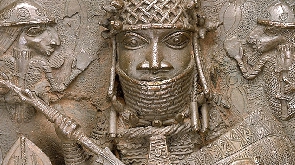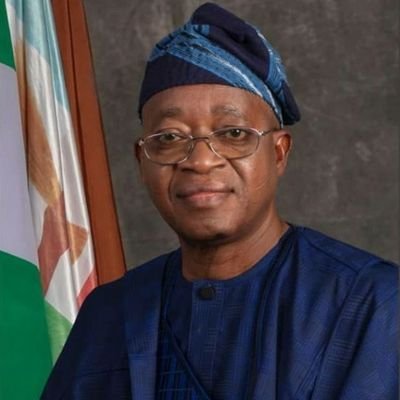Why slave descendant want di Benin Bronzes to stay for US

For our series of letters from African journalists, Nigerian writer Adaobi Tricia Nwaubani look at how descendants of slaves for US dey drag over some of Africa most famous artefacts wey dem tiff during di colonial era and end up for Western museums.
One group of African Americans don file lawsuit to stop di return of some Benin Bronzes from di Smithsonian Museum inside Washington DC to Nigeria.
Dem dey claim say di bronzes – wey British colonialists tiff during di 19th Century from di kingdom of Benin wey now be Nigeria – na also part of di heritage of descendants of slaves inside America.
And dat returning di bronzes go deny dem di opportunity to experience dia culture and history.
“Na very interesting argument,” 93-year-old David Edebiri tok, afta laughing for about 15 seconds straight.
E be part of di cabinet of di current Oba of Benin – di king or traditional ruler for Edo state, southern Nigeria.
“But di artefacts no be for di Oba alone. Na for all Benin pipo, weda you dey Benin or you dey obroad.”
Most Nigerians wey I don discuss dis US lawsuit with, don laugh tire.
But Deadria Farmer-Paellmann, wey be di founder and executive director of di Restitution Study Group (RSG) wey initiated am, dey very serious about di mata.
Di 56-year-old found RSG, one not-for-profit institute wey dey New York, for 2000 “to examine and execute innovative approache to heal di injuries of pipo wey dem oppress and exploit”.
About 100,000 slaves wey dem bring to di US, come from ports wey once dey under di control of traders from di kingdom of Benin, like Warri, Farmer-Paellmann tok.
She dey quote records from di Transatlantic Slave Trade Database wey Rice University host for Texas – and recent testing show say 23% of her DNA dey link to dis pipo.
Dis, she believe say give her and di millions of odas with similar ancestry di right to lay claim to di bronzes.
Her argument dey based on manillas, brass bracelets wey Portuguese traders introduce as form of currency.
Di Portuguese traders, wey from di 16th to the 19th Centuries dey buy different agricultural produce and local goods – plus also human beings from Africans.
Di thousands of sculptures known collectively as di Benin Bronzes, wey dem tiff afta one attack on di palace of Oba Ovonramwen Nogbaisi for 1897, dem make am with combination of metals, like brass and copper.
Di kingdom itsef no produce enough metal to supply dia casting industry, and dem rely on imports – including di brass metal from dis bracelets, wey dem melt down to create works of art.
“Fifty manillas go buy woman, 57 go buy man slave,” Farmer-Paellmann tok.
“Wetin we dey tok be say di descendants of di pipo wey trade for dis manillas get right to see di bronzes of where dem live,” she tok.
“E no get any reason why we go must travel to Nigeria to see dem,” she tok, and mention US travel warnings. “I no want make dem kidnap me.”
‘Afro-pessimism’
Critics of di case, like Mr Edebiri, argue say no be all manillas wey dem use for Benin come from di slave trade.
E don write one book about im great-great-grandfather Iyase Ohenmwen, wey be prime minister for di Oba for early 19th Century,
For di book, Edebiri detail how im great-great-grandfather trade in ivory and European clothes.
“E go take dis manillas to Igun-Eronmwon, one village for Benin wey dey manufacture all dis artefacts.
Dey go then make dem into di bronzes and oda fanciful things.”
Acclaimed Nigerian-American artist Victor Ehikhamenor, wey come from Edo state, argue say while history dey complicated, one mata dey simple:
“Di exact land from where dem take dis things from, never shift.”
For Nigerian art historian Chika Okeke-Agulu, wey be professor for Princeton University and activist for di forefront of di campaign to return artwork wey dem tiff, Farmer-Paellmann comments “sound like di argument wey white pipo wey no wan return di artefacts dey make”.
“Di lack of safety strike me as anoda version of Afro-pessimism wey we don hear for a long time,” e tok pointing to di plenti African Americans wey now dey travel go south-western Nigeria every year for di famous Yoruba Osun Osogbo festival.
Tok-tok for di return of di bronzes to Nigeria don bin dey go on since di 1930s.
“As e dey for British Museum, wey be one of di world storhouse of heritage, e dey make pipo fit dey able to see am,” according to Oliver Dowden, wey be former British culture minister, last year.
But since then some institutions for di West don finally start to return dem.
The Smithsonian Museum of African Art, in a ceremony on 11 October, transferred ownership of 20 of them to Nigeria, while nine more will remain on loan to the museum.
Another 20 are with the Smithsonian’s Museum of National History, and the process that could lead to their transfer has begun.
The Restitution Study Group’s lawsuit hopes to stop that.
‘We dey suffer from shame’
Farmer-Paellmann don dey fight for justice and reparations for di black descendants of slaves for di US.
For di 1990s, she start to dey compile evidence to show how 17 companies don gada wealth from slavery, like di insurance firm Lloyd of London.
Di legal proceedings struggle in di end for di 2000s as RSG run out of funding.
However, afta di global Black Lives Matter protests of 2020, Lloyd of London apologise for dia past link to di slave trade and dey dedicated to make financial investments to promote di welfare of black, Asian and ethnic minority groups.
Each time I write about di legacy of slavery inside Africa, I don receive hundreds of messages from African Americans wey dey express worry.
Dem dey say my stories fit affect dia quest for reparations from white descendants of slave owners, wey fit use evidence of African involvement for di transatlantic slave trade as excuse to dodge from blame for di bad-bad things wey dia ancestors’ don do.
Therefore, I dey surprise say one group like Farmer-Paellmann go openly highlight dis fact through dia lawsuit.
“A lot of shame dey,” she admit. “Na almost like pikin wey dey report dia mother for child abuse. Dat na hard thing to do.”
“But we dey suffer from di shame while di slave trader heirs dey waka go with di treasures.
“She call for more understanding outlook: “Dis na opportunity for Nigeria to take a stand, one of di biggest places where descendants of enslaved pipo come from – about 3.6 million of us – and say dat di honourable thing to do today na to share dis bronzes.
CLICK HERE TO DOWNLOAD PRESS RADIO MOBILE APP
“Dem go celebrate Nigeria for doing something like dat.”
Source: www.bbc.com







